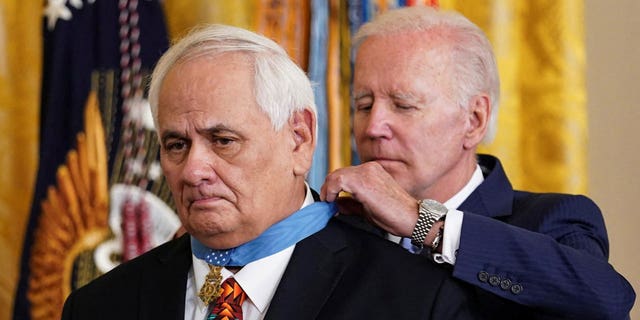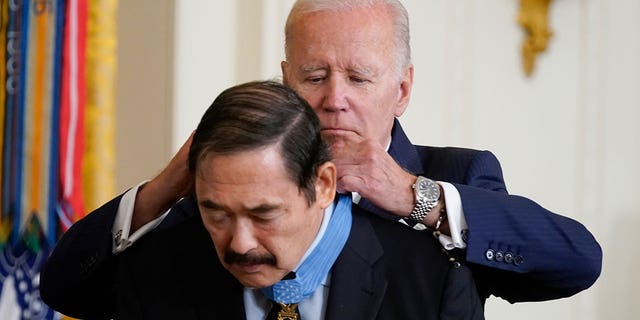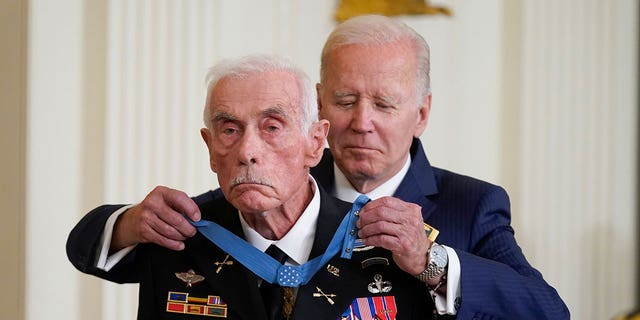Biden awards Medal of Honor to four Vietnam veterans
President Biden awarded four U.S. Army soldiers who fought in the Vietnam War the Medal of Honor Tuesday, upgrading awards they had previously received.
The president awarded the Medal of Honor to Staff Sgt. Edward Kaneshiro, posthumously, Spc. Five Dwight W. Birdwell, Spc. Five Dennis M. Fujii and Maj. John J. Duffy, all of whom “went far above and beyond the call of duty.”
“This is a day that I, quite frankly, think being president is inadequate because there’s so many great women and men in here and so many people we are honoring today,” the president said during the ceremony at the White House Tuesday. “Yesterday marked the 246th anniversary of this nation’s independence—246 years of struggle and sacrifice to uphold the principles so dear to the character of our nation: liberty, democracy, God given rights of every individual.”
“It’s a journey that has never finished, and it never will be fully finished. It is a work that requires us to look ahead to the future—we want to build and look carefully at our past,” he continued.
LAST REMAINING WORLD WAR II MEDAL OF HONOR RECIPIENT TO LIE IN HONOR AT US CAPITOL
“To understand fully where we come from, for each of those 246 years, American patriots have answered our nation’s call to military service,” Biden said. “They stood in the way of danger, risked everything—literally everything to defend our nation and our values.”
The president, though, said that “not every service member has received the full recognition they deserve.”
“Today, we’re setting the record straight,” Biden said. “We’re upgrading the awards of four soldiers who performed acts of incredible heroism during the Vietnam conflict to respect conspicuous gallantry and intrepid service.”
The president said each soldier “went far above and beyond the call of duty.”
Kaneshiro was posthumously awarded the Medal of Honor for acts of gallantry while serving near Phu Huu 2 in Vietnam on Dec. 1, 1966. Kaneshiro and his team entered the village of Phu Huu 2 while on a search and destroy mission and were attacked by North Vietnamese forces. Kaneshiro destroyed one enemy group with rifle fire and two others with grenades, which enabled the orderly extrication and reorganization of the platoon and ultimately led to a successful withdrawal from the village, according to the White House. He served in Vietnam between July 18, 1966, until his death on March 6, 1967, as a result of a hostile gunshot wound.
WOODY WILLIAMS, AMERICA’S LAST WORLD WAR II MEDAL OF HONOR RECIPIENT, DIES
Birdwell received his Medal of Honor for acts of heroism while serving in Vietnam on Jan. 31, 1968. According to the White House, that day a large enemy element initiated an assault on the Tan Son Nhut Airbase near Saigon and disabled or destroyed many of the unit’s vehicles and incapacitated Birdwell’s tank commander.

Birdwell moved the tank commander to safety and fired the tank’s weapons at the enemy force. He lated dismounted and continued fighting until receiving enemy fire to his face and torso. Birdwell refused evacuation and led a small group of defenders to disrupt the enemy assault until reinforcements arrived, the White House said. Birdwell then aided in evacuating the wounded until he was ordered to seek attention for his own wounds. He was honorably discharged on Dec. 29, 1968, and today practices law in Oklahoma City.
Fuijii received the Medal of Honor for his actions while serving as crew chief aboard a helicopter ambulance during rescue operations in Laos and the Republic of Vietnam from Feb. 18–22, 1971. According to the White House, during a mission to evacuate seriously wounded Vietnamese military personnel, Fujii’s medevac helicopter took on enemy fire and was forced to crash land.

Despite his injury, Fujii waved off a rescue from another helicopter and remained behind as the only American on the battlefield and administered first aid to allied casualties. On the night of Feb. 19, he called in American helicopter gunships to assist in repelling an enemy attack. For more than 17 hours, the White House said, Fujii repeatedly exposed himself to hostile fire as he left the security of his entrenchment to better observe enemy troop positions and to direct air strikes against them until an American helicopter could attempt to airlift him from the area. Upon completion of his tour, he joined the Army Reserve and today resides in Hawaii.

Duffy was awarded the Medal of Honor for his actions while serving as the senior adviser to the 11th Airborne Battalion, 2nd Brigade, Airborne Division, Army of the Republic of Vietnam, from April 14-15, 1972. The White House said that two days earlier, the commander of the 11th Airborne Battalion had been killed, the battalion command post destroyed, and Duffy was twice wounded, but refused to be evacuated.
According to the White House, in the early morning of April 15, after an enemy ambush, he led evacuees, many of whom were seriously wounded, to an evacuation area, where he directed gunship fire on enemy positions and marked a landing zone for the helicopters. The White House said that only after ensuring all evacuees were aboard, did he board as well, assisting a wounded friendly foreign soldier and administering aid to a wounded helicopter door gunner. Duffy’s service included three tours in Vietnam in a myriad of Special Forces assignments, and he retired from the Army on May 31, 1977. He currently lives in Santa Cruz, California.
Read the full article Here


